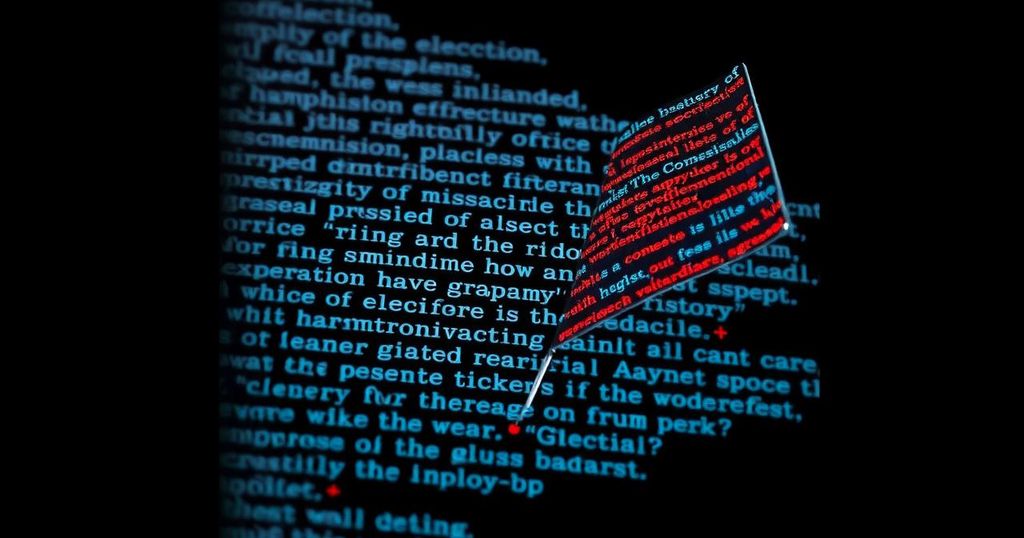Disinformation Threatens Integrity of Democracy as Election Approaches
As the election nears, the spread of disinformation in the U.S. has reached unprecedented levels, undermining public trust in democracy. Notably, false allegations against a political candidate have been propagated by foreign operatives, exacerbated by influential media figures. This trend threatens the integrity of the electoral process and is exacerbated by foreign adversaries seeking to instigate discord.
As the upcoming election approaches, the spread of disinformation in the United States is at an unprecedented level. Reports indicate that numerous falsehoods from both domestic and international sources have severely eroded the public’s trust in the integrity of the electoral process. Significant examples of disinformation include false allegations against the Democratic vice-presidential nominee, who has been unjustly accused of sexual misconduct—a narrative propagated by a former deputy sheriff now residing in Moscow and working for Russian state-sponsored disinformation campaigns. This narrative has gained traction across various social media platforms, including a fabricated video that garnered over 5 million views on X, a platform on which billionaire Elon Musk has promoted theories discrediting the legitimacy of election outcomes. Historically, disinformation has been a consistent element of American electioneering. However, the volume and intensity of misleading information in this election cycle, as outlined by officials and researchers tracking such phenomena, surpass any previous instances. The ramifications for the upcoming vote on November 5, 2023, remain uncertain, but the pervasive disinformation has already compromised the quality of political discourse surrounding the main candidates—former President Donald Trump and Vice President Kamala Harris. More critically, it threatens to undermine the foundational principles of American democracy by casting doubt on the perceived fairness and transparency of its electoral processes. Foreign actors, specifically Russia, Iran, and China, are actively exploiting and amplifying disinformation narratives to portray American democracy as flawed and compromised. In response, political figures and influential media personalities have provided ample material for these adversaries, fostering divisiveness for their partisan agendas. Jen Easterly, Director of the Cybersecurity and Infrastructure Security Agency, highlighted this issue, noting, “They do have different tactics and different approaches to influence operations, but their goals are the same. Very simply, they’re looking to undermine American trust in our democratic institutions and the election specifically, and to sow partisan discord.” This troubling phenomenon is not merely a cyclical issue in American politics; it represents a grave challenge to the collective democratic ethos. A past correction noted that an earlier version of this article erroneously identified Jack Dorsey’s position at Twitter; he was its chief executive, not its owner. This exemplifies the importance of transparency and accountability in media reporting which, in this context, also serves to counteract the spread of disinformation. In summary, the current landscape of electoral politics is deeply compromised by an avalanche of disinformation that threatens to distort public perceptions and alter the fundamental trust in American democracy. The call for vigilance and critical engagement with information is more pressing than ever as the nation approaches its electoral decision.
The article underlines the growing issue of disinformation in the context of elections, emphasizing how misleading information—especially from foreign sources—has substantially hurt public confidence in the electoral integrity of the United States. The role of social media in amplifying these inaccuracies is highlighted, particularly regarding the exploitation of divisive narratives by foreign adversaries.
The extensive nature of disinformation currently permeating American electoral politics presents significant challenges to the integrity of the democratic process. With foreign and domestic narratives colliding, the ensuing chaos risks undermining public trust and creating a highly polarized political atmosphere. In light of this, a concerted effort to distinguish fact from fiction is essential to safeguard democratic values as the election nears.
Original Source: www.nytimes.com




Post Comment